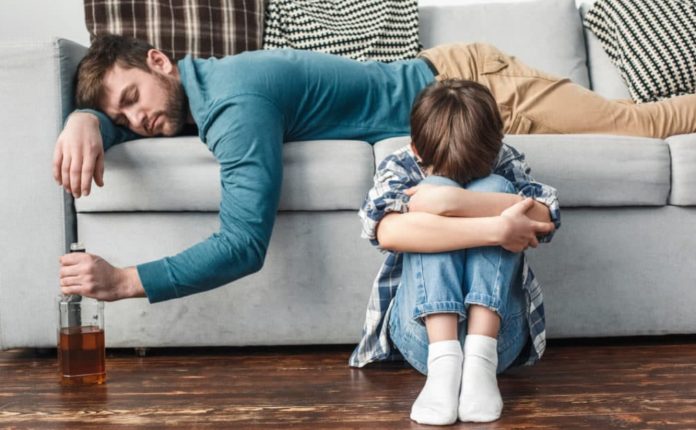Good parenting is crucial in raising responsible, confident and intelligent adults. However, some children do not get the advantage of good parenting because their parents have an alcohol addiction. As a result, these children never experience a traditional loving relationship and receive mental scars (due to uncontrolled parental behaviour) that last throughout their lifetime.
According to research, 1 in 10 children lives with a parent who suffers from an Alcohol Use Disorder (AUD).
So, it is possible that someone living next door to you might be suffering from alcohol addiction. If you see a parent with an alcohol abuse problem, you can help them overcome it and save their children from a dark future by encouraging them to seek support from an alcoholic rehab center.
Psychological and Emotional Effects of Alcoholic Parents on Children
A child is like a blank slate whose life story is written by their parents. But due to psychological and emotional scars, their life story can become a tale of woes. Below are some detrimental psychological and emotional effects of alcoholic parents on children that can have a huge bearing on their lives:
Children Grow Up with the Wrong Definition of Normal Family Life
The definition of normal family life is not straightforward for children whose parents abuse alcohol. When they come face-to-face with reality and understand that alcohol use is not normal and scoffed upon, they can become conflicted and confused. In addition, due to exposure to bad behaviour in early life, they end up taking up bad habits and following the wrong role models in their lives.
Fear of Confrontation
If an alcoholic parent physically abuses a child, the child may become afraid of confrontations in the future. Moreover, it can prevent them from being competitive in sports, studies and other essential endeavours of life.
A Lack of Trust in Others
Alcoholic parents often lie, cheat and keep secrets from one another. They often make commitments and either forget about them or deny ever making them. As a result, children start having trust issues in the early parts of their lives, which might continue to plague them in adulthood.
Low Self-Esteem
Children of alcoholic parents often suffer from low self-esteem. Once they start meeting other children and expanding their social circles, they might feel that they are different from others, leading to a feeling of inadequacy. Eventually, low self-esteem severely impacts the studies and career of a child.
How to Confront a Fellow Parent About Their Alcohol Addiction?
Confronting a fellow parent about their alcohol addiction can be tricky. But if you can do an alcohol intervention, you can play a positive role in enhancing the future of children going through a rough life patch.
- Choose a time and place to have a private and comfortable conversation with an alcoholic parent.
- Express your concerns in a non-judgemental way and tell them how their drinking affects their children’s lives.
- Allow the person to share their perspective and feelings without interruption. Be empathetic and try to understand their point of view.
- Show the alcoholic parent that you are there to support them through their recovery process. Provide them help in finding resources, such as support groups and addiction treatment programs
Alcohol Addiction Treatment for Parents
Alcoholic parents might not realize the damage they do to their children unintentionally. So, it is important to inform them about the dangers (as discussed above) and provide them with the best alcohol addiction treatment.
When assisting a fellow parent in overcoming alcohol addiction and navigating the unseen parent trap, consider the options available for outpatient rehab for drugs and alcohol in Arizona as a supportive resource.
During the alcohol addiction treatment, the following steps can be taken:
- Behavioural Therapy: Therapy aims to help the person identify the root causes of their addiction and develop strategies for coping with triggers and preventing relapse.
- Lifestyle Changes: An alcoholic is encouraged to make lifestyle changes, which can be an important part of recovery. This may include adopting healthy eating habits, exercising regularly, and developing new hobbies and interests to replace drinking.
- Medication and Detoxification: In some severe cases of alcohol addiction, medical detoxification and medications are required.
- Care After Treatment: After finishing formal treatment, ongoing support and care are essential to maintaining sobriety. As a fellow parent, you can pitch in some efforts and support the recovering parent after treatment.
Summary
Alcohol addiction among parents is like an unseen trap that can destroy children’s futures. It can hamper their emotional development and leave them scarred for life. As a fellow parent, you can make a tremendous difference in the lives of children by making a timely intervention. Confront fellow parents and talk to them in a non-judgemental manner. Help them seek addiction help through alcohol intervention and bring about a positive change in the lives of children.
Disclaimer: This article contains sponsored marketing content. It is intended for promotional purposes and should not be considered as an endorsement or recommendation by our website. Readers are encouraged to conduct their own research and exercise their own judgment before making any decisions based on the information provided in this article.




































